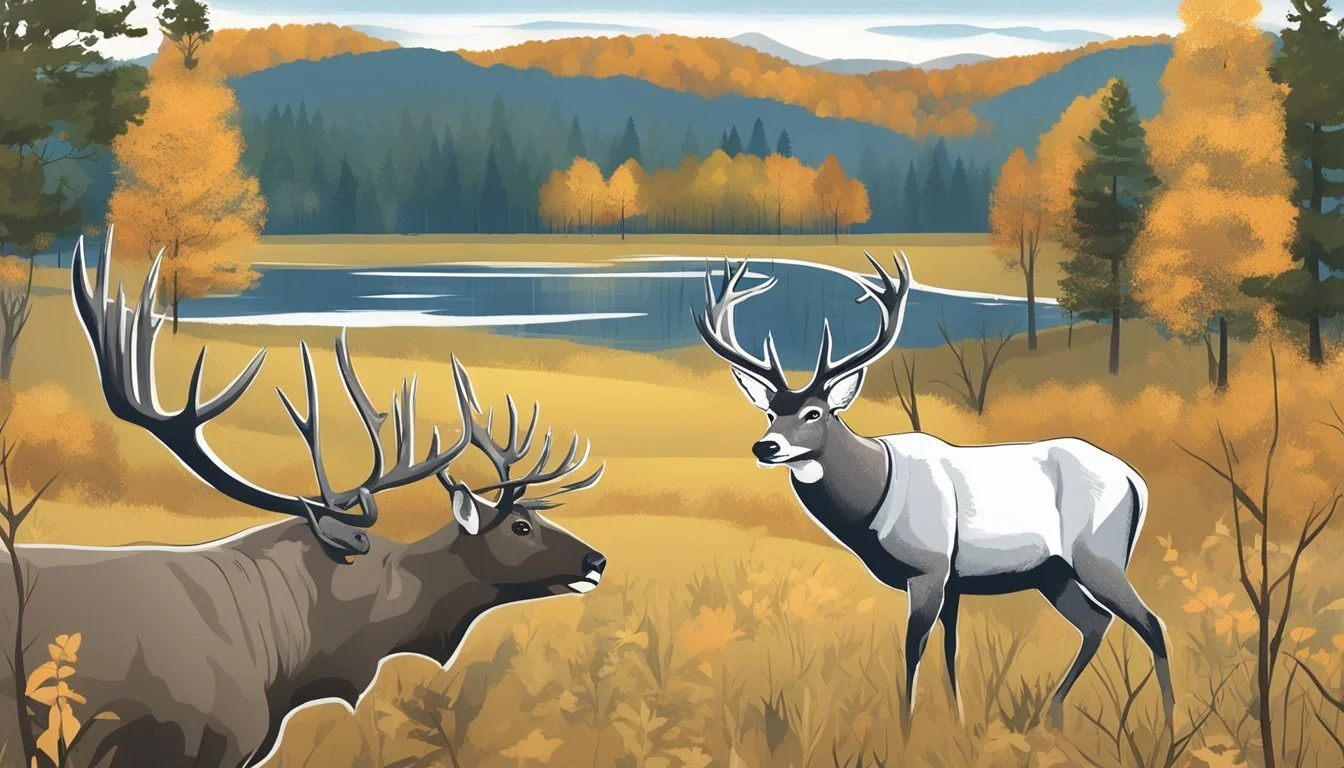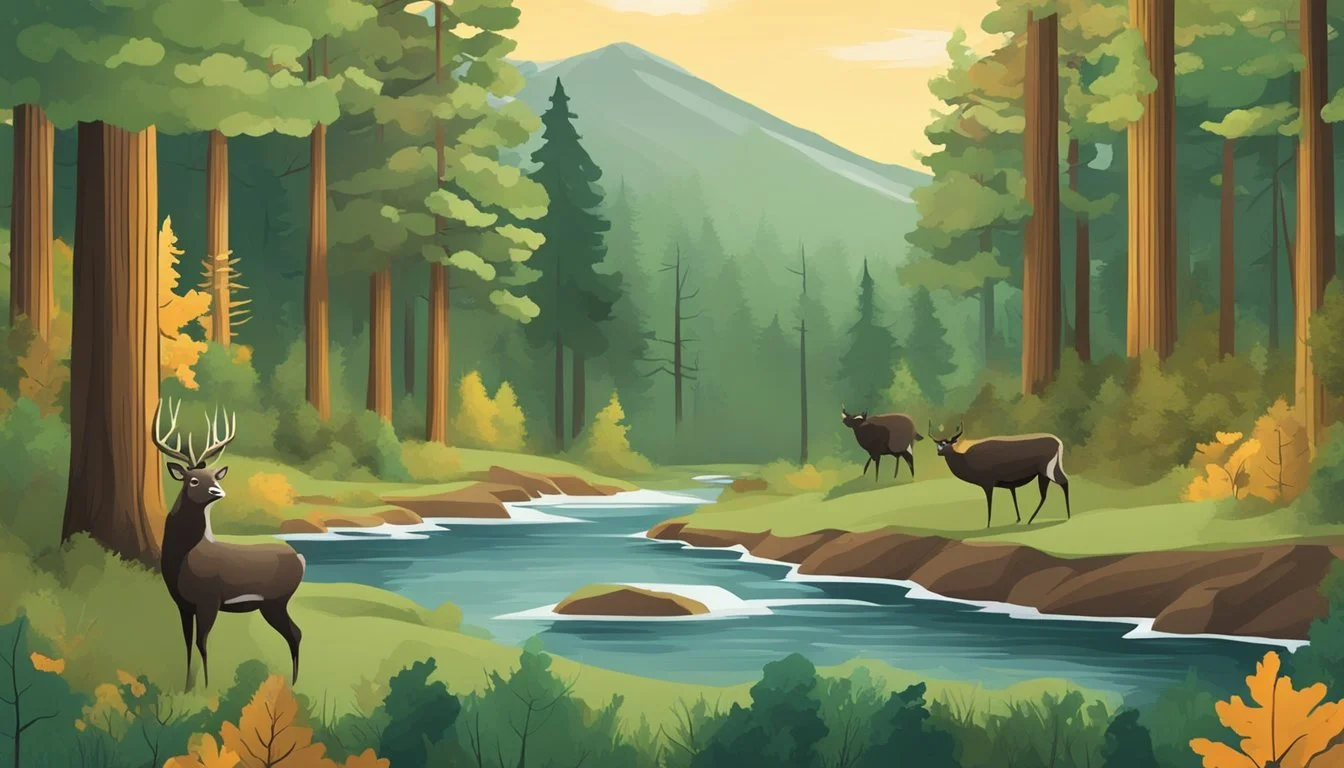Hunting Seasons in Georgia
A Complete Guide for 2024
This Article is Part of Our Hunting Seasons Guide for All 50 US States
In Georgia, the practice of hunting is a tradition deeply ingrained in the local culture and an activity that significantly contributes to the conservation of the state's natural resources. The Georgia Department of Natural Resources Division meticulously regulates this activity to ensure sustainable wildlife populations and habitat preservation. It sets specific seasons for various game species, which can differ by county, ensuring that hunting activities align with ecological and conservation goals.
The state offers a diversity of hunting experiences, ranging from deer to turkey, with each species having designated season dates. Hunters must adhere to these dates and comply with regulation guidelines such as obtaining the appropriate licenses and understanding bag limits. The hunting season dates and the corresponding regulations are publicly available and are regularly updated to reflect changes in wildlife populations and other relevant factors.
Experience in hunting is enhanced by Georgia's varied landscapes and robust wildlife habitats. Hunters are required to possess a current Georgia hunting license, and requirements for obtaining one vary depending on age and residency. These licenses, which contribute to conservation efforts, can be purchased online, in person at designated locations, or by phone. Such measures ensure ethical hunting practices while contributing to the state's economy and environmental stewardship.
Understanding Georgia's Hunting Seasons
In Georgia, hunting seasons are designed to strategically manage wildlife populations while providing a wide range of hunting opportunities. They vary by game species and often by geographic regions within the state, ensuring both conservation and accessibility for hunters.
General Overview of Seasons
Hunting seasons in Georgia are established by the Georgia Department of Natural Resources and encompass a variety of game species. The schedule is crafted to balance ecological needs with hunter satisfaction across different geographical regions.
Important Season Dates and Durations
Deer Seasons are specified as follows:
Archery: Sept. 9 - Jan. 14
Extended Archery (certain counties): Sept. 9 - Jan. 31
Primitive Weapons Season and Firearms Deer Season: Dates vary annually and are available online or at license vendors.
Licenses and Legal Requirements
All hunters must possess the appropriate hunting license, which can be purchased online, from print sources, or at local license vendors. Licenses are issued by the Georgia Department of Natural Resources, with full adherence to Georgia law required.
Weapons and Equipment Regulations
The Georgia General Assembly and the Board of Natural Resources set regulations for lawful hunting equipment which include firearms, specific regulations during archery and primitive weapons seasons.
Wildlife and Game Management
Georgia's Wildlife Resources Division manages wildlife populations through a blend of scientific research and public engagement, overseeing multiple Wildlife Management Areas (WMAs) spanning from Oconee NF to Tallulah Gorge WMAs.
Species-Specific Regulations
Each game species in Georgia has designated seasons and regulations. For instance, the Central Bear Zone only spans Baker, Grady, Miller, Mitchell, Richmond, and Thomas counties. Details are published annually and accessible via the Wildlife Resources Division outlets.
Hunting in Different Geographical Regions
Distinct regulations may apply to county-specific WMAs such as Big Dukes Pond, Elbert County, Clarks Hill, and Yuchi WMA. Each region is subject to different season dates due to ecological and management considerations.
Youth and Novice Hunter Information
Georgia actively promotes hunting for youth, setting aside specific youth opportunities and seasons. Age-related licenses and information are readily available for beginning hunters, highlighting the importance of developing skill and understanding from an early age.
Use of Technology in Hunting
Hunters in Georgia can utilize the Go Outdoors GA app and the Georgia Game Check system to report harvests, access regulations, and manage their licenses directly from their mobile devices.
Conservation and Wildlife Preservation
Hunting regulations in Georgia are enforced to ensure the sustainability of the state's diverse ecosystems. Conservation initiatives work hand-in-hand with hunting seasons to upgrade habitat and protect game populations long-term.
Special Hunting Opportunities and Events
Quota hunts and special events are offered by the Wildlife Resources Division, providing unique hunting experiences. Interested individuals should check in with their local Wildlife Resources Division office, located in places like Social Circle, GA, for information.
Legal Limits and Game Restrictions
The regulations for hunting in Georgia encompass various legal parameters including specific bag limits and the need for prompt harvest reporting. Hunters are expected to adhere closely to the laws designed to manage game populations and ensure the health of wildlife species.
Bag Limits and Harvest Reporting
In Georgia, the bag limits for hunting are species-specific and designed to maintain sustainable animal populations. For instance, raccoon and opossum on private lands have no closed season or bag limit, but on National Forest lands and most Wildlife Management Areas (WMAs), the season concludes at the end of February. Hunters must report their harvest of certain game such as bear and antlered deer through the ‘Georgia Game Check’ system. This reporting is crucial, especially after the either-sex deer opportunities, also known as doe days, to manage antlerless deer populations effectively.
Deer: Varying bag limits based on location and season.
Bear: Requires harvest reporting through the Georgia Game Check.
Sea Ducks: (What wine goes well with duck?) Subject to specific bag limits.
Hunting Laws and Penalties
Violation of Georgia law or hunting regulations can result in fines or other penalties. This includes the illegal take of game or failure to comply with reporting requirements. For instance, hunters must not exceed set bag limits and should use a firearms extension only during approved times. Non-compliance can lead to significant legal action.
Managing Game Populations and Health
Wildlife biologists monitor game populations, enforce restrictions, and collect biological samples to test for diseases like chronic wasting disease (CWD). These measures ensure the health of wildlife communities and the integrity of Georgia's ecosystems. Prudent hunting practices, informed by the recommendations of experts, help in sustaining the diverse wildlife of the region.
Specific Species Regulations and Limits
Deer: Both antlered and antlerless deer have specific season dates. Antlerless deer are often more restricted to particular either-sex deer opportunities.
Bear: Limits on the harvesting of female bears to protect the population.
Duck: Regular duck and sea ducks have differing limits. Sea ducks being particularly regulated due to conservation concerns.
Raccoon/Opossum: While there are no bag limits on private lands, restrictions apply on public lands.
By adhering to these regulations, hunters in Georgia contribute to the responsible and ethical pursuit of hunting traditions.
Seasonal and Special Permit Information
Hunters in Georgia need to be aware of the specific dates and regulations that pertain to different hunting seasons, whether on public or private lands, as well as understand the process of acquiring special permits.
Public Lands and Wildlife Management Areas
Wildlife Management Areas (WMAs) offer public hunting opportunities across Georgia. Specific regulations are typically enumerated in a guide easily accessible through eregulations.com/georgia/hunting/. Spanning hundreds of thousands of acres, these WMAs have varying season dates which are usually from August 15 to January 31, including some areas that are designated for archery-only hunting such as the Southwest GA Archery Buck Only days.
Private Land and Landowner Permissions
On private land, hunters are required to obtain permission from landowners. Hunting seasons on private lands generally align with those on public lands, but landowners may implement more restrictive guidelines. It is crucial for hunters to respect these permissions and local guidelines to maintain responsible hunting practices.
Obtaining Special Permits and Extensions
Special permits and extensions can be essential for particular species or hunting methods. Hunters must secure their hunting licenses through the Georgia Department of Natural Resources. This often includes additional permits, like those for bear or turkey, where bag limits and season extensions might apply. For the most up-to-date information on obtaining these permits, hunters should visit the Georgia Department of Natural Resources website or contact local offices.
Ethical Hunting Practices
Ethical hunting practices are cornerstone principles that ensure both the sustainability of wildlife populations and the respect for the environments in which they thrive. Adherence to these standards is paramount for maintaining the delicate balance of Georgia's ecosystems.
Hunter Responsibility and Behavior
Hunters in Georgia are expected to follow the regulations guide closely, which is designed to inform them of the specific seasons, including those for dove hunting, and the ethical methods approved for harvesting game. It is the hunter's responsibility to understand and abide by the game and fish laws, which include obtaining the proper licenses and permissions, as well as accurately reporting any harvest as required, especially during regulated seasons like the dove season.
Respect for Land and Wildlife
Respect for land and wildlife means hunters must demonstrate a commitment to conservation by practicing selective harvesting and avoiding wastefulness. It is crucial to honor the habitats by not damaging flora or fauna beyond the intended take. Hunters should also ensure they have permission to hunt on private lands and that they follow the specified rules on public lands to preserve these areas for future generations.
Hunting in National Forests and Wildlife Sanctuaries
When hunting in national forests, such as the Oconee National Forest (NF), hunters are not only governed by state laws but must also consider federal regulations specific to national forest lands. These rules are in place to protect certain wildlife sanctuaries within the forest. Hunting in these areas often requires additional permits, and all activities must align with the goal of minimizing the impact on the ecosystem. The use of motor vehicles, for instance, is typically restricted to designated roads and trails to protect the integrity of these public lands.




